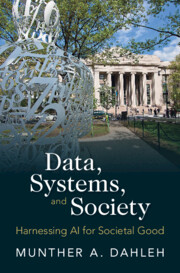Book contents
- Data, Systems, and Society
- Reviews
- Data, Systems, and Society
- Copyright page
- Contents
- Preface
- 1 The Pitfalls, Promises, and Challenges of Data
- 2 A Confluence of Fields
- 3 Who – and What – Should Drive Decision-Making?
- 4 A Transdiscipline Is Born
- 5 Complexity versus Relevance
- 6 The Care and Feeding of a New Discipline at MIT
- 7 People, Programs, and Research
- 8 Personal Reflections on the Journey
- Acknowledgments
- Bibliography
- Index
5 - Complexity versus Relevance
The Power of Abstractions
Published online by Cambridge University Press: 24 March 2025
- Data, Systems, and Society
- Reviews
- Data, Systems, and Society
- Copyright page
- Contents
- Preface
- 1 The Pitfalls, Promises, and Challenges of Data
- 2 A Confluence of Fields
- 3 Who – and What – Should Drive Decision-Making?
- 4 A Transdiscipline Is Born
- 5 Complexity versus Relevance
- 6 The Care and Feeding of a New Discipline at MIT
- 7 People, Programs, and Research
- 8 Personal Reflections on the Journey
- Acknowledgments
- Bibliography
- Index
Summary
This chapter explores the role of abstraction in addressing complex societal issues, challenging the perception that abstractions are merely approximations that separate physical systems from high-level computational systems. It emphasizes the importance of intentional and expert-driven abstraction in modeling and analyzing intricate systems. The chapter argues that deriving abstractions is a creative process lacking a systematic methodology.
Drawing examples from information theory and equilibrium theory, the chapter illustrates how abstractions have shaped discoveries over time. It emphasizes the close relationship between abstractions and objectives, noting the presence of multiple abstractions within a single domain.
The chapter concludes with an example demonstrating how abstractions can offer valuable insights into questions surrounding collective intelligence and crowd-sourcing.
- Type
- Chapter
- Information
- Data, Systems, and SocietyHarnessing AI for Societal Good, pp. 73 - 88Publisher: Cambridge University PressPrint publication year: 2025

